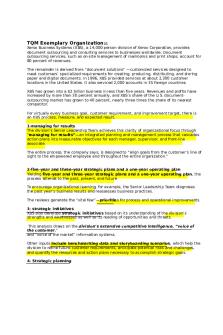Al- kateb case summary PDF

| Title | Al- kateb case summary |
|---|---|
| Course | Statutory Interpretation |
| Institution | Queensland University of Technology |
| Pages | 2 |
| File Size | 76 KB |
| File Type | |
| Total Downloads | 23 |
| Total Views | 164 |
Summary
Download Al- kateb case summary PDF
Description
Al-Kateb v Godwin (2004) 219 CLR 562 Migration Act 1958 (Cth):
Section 189 conferred power on the Executive to detain an unlawful non-citizen.
Under s 196, an unlawful non-citizen detained under s 189 to be kept in detention until removed, deported or granted a visa.
Under s 198, an unlawful non-citizen who requests to be removed from Australia should be removed as soon as reasonably practicable.
Mr Al-Kateb was detained under the Migration Act.
He was a stateless person who had arrived in Australia without a visa and his application for a protection visa was refused.
There was no real prospect of his removal from Australia.
Mr Al-Kateb challenged his potentially indefinite detention under the Migration Act. Two issues for consideration by the HCA: 1. Whether the Migration Act permitted the Executive to detain a person in Mr AlKateb’s situation indefinitely; and
2. Whether legislation such as the Migration Act which authorised indefinite detention was constitutionally valid.
HCA held that the Act authorised indefinite detention and was constitutionally valid. The Act abrogated the right to freedom by using terminology that was clear, unambiguous and retractable. The operation of ss 189, 196 and 198 made it clear that Mr Al-Kateb’s detention had to continue until deportation, no matter how long that took.
The minority found that the Act did not permit detention of Mr Al-Kateb in these circumstances.
The purpose of s 196 was removal. Once it was clear that a person could not be deported, that person could not be held ‘for the purpose of’ deportation.
Ongoing detention was not ‘lawful detention’.
Gleeson CJ applied the principle of legality.
A fundamental right was at stake (personal liberty): o
‘Courts do not impute to the legislature an intention to abrogate or curtail certain human rights or freedoms (of which personal liberty is the most basic)
unless such an intention is clearly manifested by unambiguous language’: at [19].
No indication that the legislature had directed its attention to the question of indefinite administrative detention.
‘The possibility that a person […] can be subjected to indefinite and perhaps permanent, administrative detention is not one to be dealt with by implication’: at [21].
The Parliament had not provided for the exact circumstances that faced Mr Al-Kateb, which meant that the Act should be interpreted as not intending to cover his situation.
Gleeson CJ chose the interpretation of the Act which minimised infringement on the right to liberty.
The fact that the Act provided for mandatory detention was an important factor in Gleeson CJ’s interpretation of the Act.
Mr Al-Kateb’s detention was not authorised by the Migration Act and was therefore unlawful.
Summary The principle of legality means that Courts will not impute to the legislature an intention to abrogate fundamental rights unless such an intention is manifested very clearly. Intention may be expressed by clear and unambiguous words or inferred by necessary implication....
Similar Free PDFs

Al- kateb case summary
- 2 Pages

Al Kateb v Godwin Case Summary
- 6 Pages

Carmichele Case - case summary
- 53 Pages

CASE summary - Case summarisa
- 3 Pages

Case summary
- 70 Pages

Case summary
- 2 Pages

Case Summary - contract b case
- 9 Pages

Ikea Case - Ikea case summary
- 1 Pages

Al Baba Sweets Case Study
- 13 Pages

Boeing 767 Case Summary
- 4 Pages

Case study summary
- 2 Pages

Case Processing Summary
- 3 Pages

Alcock case summary
- 1 Pages

Case summary Gabcikovo Nagymaros
- 15 Pages

MWB CASE summary
- 4 Pages

Grootboom Case Summary
- 4 Pages
Popular Institutions
- Tinajero National High School - Annex
- Politeknik Caltex Riau
- Yokohama City University
- SGT University
- University of Al-Qadisiyah
- Divine Word College of Vigan
- Techniek College Rotterdam
- Universidade de Santiago
- Universiti Teknologi MARA Cawangan Johor Kampus Pasir Gudang
- Poltekkes Kemenkes Yogyakarta
- Baguio City National High School
- Colegio san marcos
- preparatoria uno
- Centro de Bachillerato Tecnológico Industrial y de Servicios No. 107
- Dalian Maritime University
- Quang Trung Secondary School
- Colegio Tecnológico en Informática
- Corporación Regional de Educación Superior
- Grupo CEDVA
- Dar Al Uloom University
- Centro de Estudios Preuniversitarios de la Universidad Nacional de Ingeniería
- 上智大学
- Aakash International School, Nuna Majara
- San Felipe Neri Catholic School
- Kang Chiao International School - New Taipei City
- Misamis Occidental National High School
- Institución Educativa Escuela Normal Juan Ladrilleros
- Kolehiyo ng Pantukan
- Batanes State College
- Instituto Continental
- Sekolah Menengah Kejuruan Kesehatan Kaltara (Tarakan)
- Colegio de La Inmaculada Concepcion - Cebu